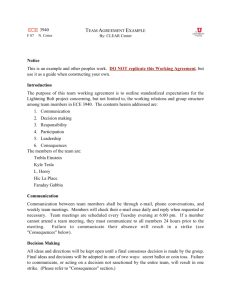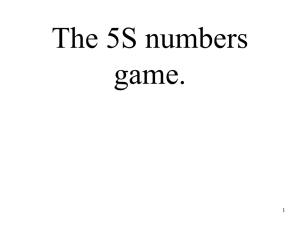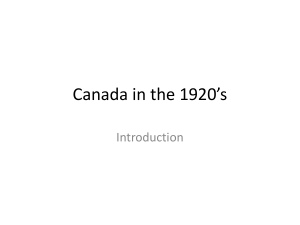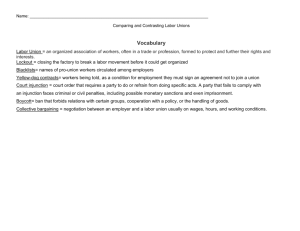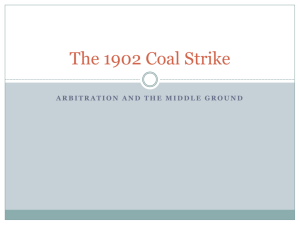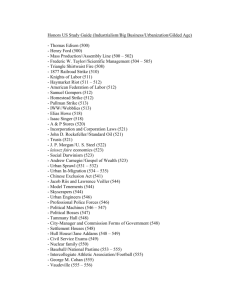Striking
advertisement
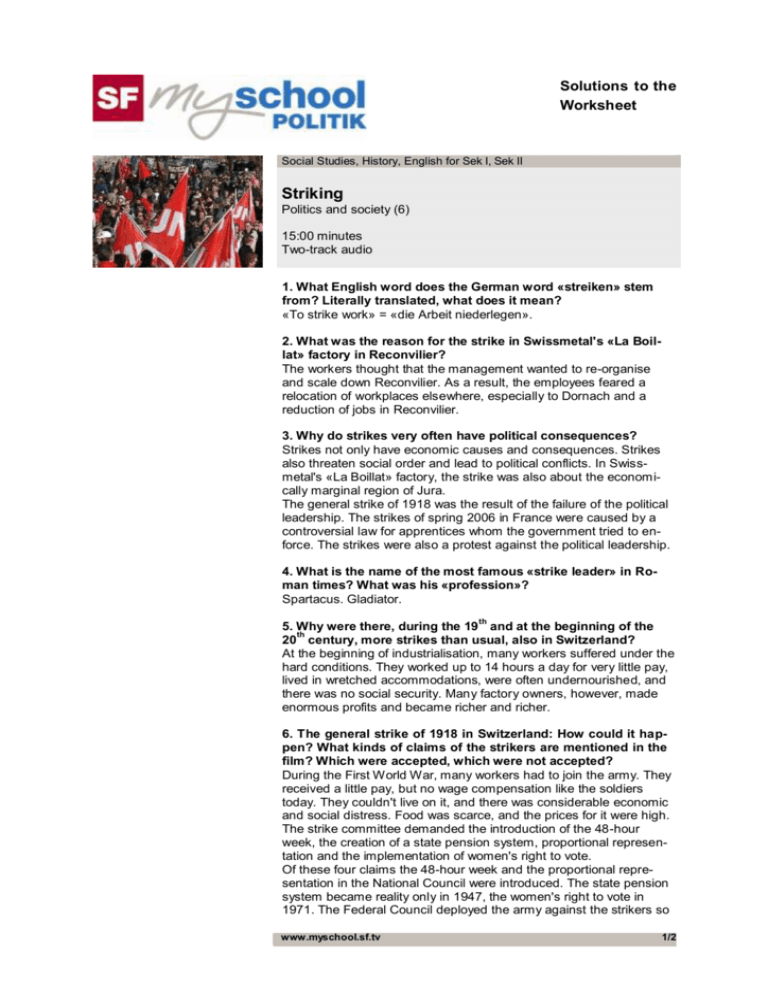
Solutions to the Worksheet Social Studies, History, English for Sek I, Sek II Striking Politics and society (6) 15:00 minutes Two-track audio 1. What English word does the German word «streiken» stem from? Literally translated, what does it mean? «To strike work» = «die Arbeit niederlegen». 2. What was the reason for the strike in Swissmetal's «La Boillat» factory in Reconvilier? The workers thought that the management wanted to re-organise and scale down Reconvilier. As a result, the employees feared a relocation of workplaces elsewhere, especially to Dornach and a reduction of jobs in Reconvilier. 3. Why do strikes very often have political consequences? Strikes not only have economic causes and consequences. Strikes also threaten social order and lead to political conflicts. In Swissmetal's «La Boillat» factory, the strike was also about the economically marginal region of Jura. The general strike of 1918 was the result of the failure of the political leadership. The strikes of spring 2006 in France were caused by a controversial law for apprentices whom the government tried to enforce. The strikes were also a protest against the political leadership. 4. What is the name of the most famous «strike leader» in Roman times? What was his «profession»? Spartacus. Gladiator. 5. Why were there, during the 19 th and at the beginning of the th 20 century, more strikes than usual, also in Switzerland? At the beginning of industrialisation, many workers suffered under the hard conditions. They worked up to 14 hours a day for very little pay, lived in wretched accommodations, were often undernourished, and there was no social security. Many factory owners, however, made enormous profits and became richer and richer. 6. The general strike of 1918 in Switzerland: How could it happen? What kinds of claims of the strikers are mentioned in the film? Which were accepted, which were not accepted? During the First World War, many workers had to join the army. They received a little pay, but no wage compensation like the soldiers today. They couldn't live on it, and there was considerable economic and social distress. Food was scarce, and the prices for it were high. The strike committee demanded the introduction of the 48-hour week, the creation of a state pension system, proportional representation and the implementation of women's right to vote. Of these four claims the 48-hour week and the proportional representation in the National Council were introduced. The state pension system became reality only in 1947, the women's right to vote in 1971. The Federal Council deployed the army against the strikers so www.myschool.sf.tv 1/2 Solutions to the Worksheet Striking that the strike committee finally gave up. 7. What do you know about Karl Marx? Karl Marx (1818–1883) formulated his theory of class struggle. In his work «Communist Manifesto», he predicted the rebellion of workers against the forces of capital and against the factory owners, the rebellion of the proletariat against the bourgeoisie. 8. What does the peace agreement of 1937 include, and what consequences did it have? Absolute peace obligation of the social partners, of the employees and the employers. Going on strike is illegal, you have to negotiate. If no agreement can be reached external arbitrators have to decide. Since 1937, the workers in Switzerland have very rarely gone on strike, compared with our neighbouring countries. 9. What arguments does Swissmetal's head Martin Hellweg use to criticise the strikers? How does the strike leader Nicolas Wuillemin defend himself? For Martin Hellweg, the strike in Swissmetal's factory in Reconvilier and the occupation of the warehouse were illegal. He refers to the absolute peace obligation. Nicolas Wuillemin, on the other hand, admits that the metal workers of the «La Boillat» factory are subject to a collective employment agreement which demands total freedom from industrial disputes. But he thinks that the strike was legal because the problems be- tween the workers and the management in Reconvilier are not de- scribed in the collective employment agreement. The strike was the last weapon to enforce the rights of the workers. The right to strike is a constitutional right in Switzerland. 10. Why, in the last few years, have there been more and longer strikes, even in Switzerland? Professor Jakob Tanner says that the increase of strikes even in Switzerland has to do with globalisation. Companies think globally, trying to produce as efficiently as possible, which means an amalgamation of businesses and a relocation of workplaces. This is a problem for marginal regions like Jura. 11. Describe some negative consequences of strikes. Companies cannot produce anymore and suffer significant losses, may even go bankrupt. The workers may lose their jobs. In the case of a garbage strike, the negative consequences are foul smells and pests. When public transport personnel stop work, this can lead to annoying delays. Strikes sometimes escalate and result in violence. 12. In what kind of situations would you go on strike yourself? Individual answer www.myschool.sf.tv 2/2
